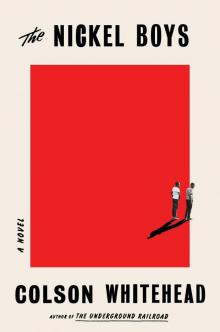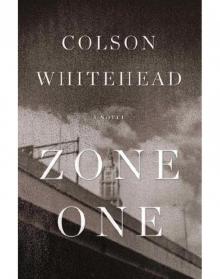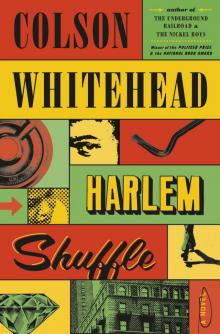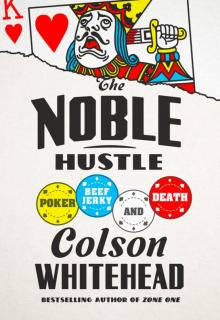- Home
- Colson Whitehead
The Underground Railroad Page 21
The Underground Railroad Read online
Page 21
How the old white bitch had lied! He should have been living with his mother and father in their cottage, rounding off barrels for the cooper or apprenticed to another of the town’s craftsmen. His prospects were limited by his race, to be sure, but Caesar had grown up believing he was free to choose his own fate. “You can be whatever you want to be,” his father said.
“Even go to Richmond?” From all reports, Richmond sounded far away and splendid.
“Even Richmond, if you like.”
But the old woman had lied and now his crossroad was reduced to one destination, a slow death in Georgia. For him, for his entire family. His mother was slight and delicate and not made for field labor, she was too kind to endure the plantation’s battery of cruelties. His father would hold out longer, donkey that he was, but not much. The old woman had destroyed his family so thoroughly it couldn’t have been accidental. It wasn’t her niece’s greed—the old woman had played a trick on them the whole time. Tightening the knots every time she held Caesar in her lap and taught him a word.
Caesar pictured his father cutting cane in a Florida hell, burning his flesh as he stooped over the big kettles of molten sugar. The cat-o’-nine-tails biting into his mother’s back when she failed to keep the pace with her sack. Stubborn breaks when it don’t bend, and his family had spent too much time with the kindly white folks in the north. Kindly in that they didn’t see fit to kill you fast. One thing about the south, it was not patient when it came to killing negroes.
In the old crippled men and women of the plantation he saw what lay in store for his mother and father. In time, what would become of him. At night, he was certain they were dead; in the daylight, merely maimed and half dead. Either way he was alone in the world.
Caesar approached her after the races. Of course she waved him away. She didn’t know him. It could’ve been a prank, or a trap laid by the Randalls in a fit of boredom. Running was too big an idea—you had to let it set a while, turn it around in your head. It took Caesar months to permit it into his thoughts, and he needed Fletcher’s encouragement to let it truly live. You need someone else to help you along. Even if she didn’t know she’d say yes, he did. He’d told her he wanted her for good luck—her mother was the only one to ever make it out. Probably a mistake, if not an insult, to someone like her. She wasn’t a rabbit’s foot to carry with you on the voyage but the locomotive itself. He couldn’t do it without her.
The terrible incident at the dance proved it. One of the house slaves told him the brothers were drinking at the big house. Caesar took it as a bad omen. When the boy carried the lantern down to the quarter, his masters following, violence was assured. Chester had never been beaten. Now he had been, and tomorrow he’d get his first hiding. No more children’s games for him, races and hide-and-seek, but the grim trials of slave men. No one else in the village made a move to help the boy—how could they? They’d seen it a hundred times before, as victim or witness, and would see it a hundred times more until they died. But Cora did. She shielded the boy with her own body and took his blows for him. She was a stray through and through, so far off the path it was like she’d already run from the place long ago.
After the beating Caesar visited the schoolhouse at night for the first time. Just to hold the book in his hands. To make sure it was still there, a souvenir from a time when he had all the books he wanted, and all the time to read them.
What became of my companions in the boat, as well as those who escaped on the rock, or were left in the vessel, I cannot tell; but conclude they were all lost. The book will get him killed, Fletcher warned. Caesar hid Travels into Several Remote Nations in the dirt under the schoolhouse, wrapped in two swatches of burlap. Wait a little longer until we can make the preparations for your escape, the shopkeeper said. Then you can have any book you want. But if he didn’t read, he was a slave. Before the book the only thing to read was what came written on a bag of rice. The name of the firm that manufactured their chains, imprinted in the metal like a promise of pain.
Now a page here and there, in the golden afternoon light, sustained him. Guile and pluck, guile and pluck. The white man in the book, Gulliver, roved from peril to peril, each new island a new predicament to solve before he could return home. That was the man’s real trouble, not the savage and uncanny civilizations he encountered—he kept forgetting what he had. That was white people all over: Build a schoolhouse and let it rot, make a home then keep straying. If Caesar figured the route home, he’d never travel again. Otherwise he was liable to go from one troublesome island to the next, never recognizing where he was, until the world ran out. Unless she came with him. With Cora, he’d find the way home.
Indiana
50 REWARD.
LEFT my house on Friday evening the 26th about 10 o’clock P.M. (without provocation whatever) my negro girl SUKEY. She is about 28 years of age, of rather a light complexion, has high cheek bones, is slender in her person, and very neat in her appearance. Had on when she went away, a striped jean frock. Sukey was lately owned by L. B. Pearce, Esq. and formerly belonged to William M. Heritage, deceased. She is at present (from appearance) a strict member of the Methodist Church in this place, and is no doubt known to a majority of the members.
JAMES AYKROYD
OCTOBER 4
THEN she became the one lagging in her lessons, surrounded by impatient children. Cora was proud of the progress she made with her reading in South Carolina and the attic. The shaky footing of every new word, an unknown territory to struggle through letter by letter. She claimed each circuit through Donald’s almanacs as a victory, then returned to the first page for another round.
Georgina’s classroom revealed the smallness of her accomplishments. She didn’t recognize the Declaration of Independence the day she joined them in the meeting house. The children’s pronunciation was crisp and mature, so distant from Michael’s stiff recitations back on Randall. Music lived in the words now, the melody asserting itself as each child took their turn, bold and confident. The boys and girls stood from the pews, turned over the paper where they’d copied the words, and sang the promises of the Founding Fathers.
With Cora, the class numbered twenty-five. The youngest—the six- and seven-year-olds—were exempt from the recital. They whispered and fussed in the pews until Georgina hushed them. Nor did Cora participate, being new to the class, the farm, their way of doing things. She felt conspicuous, older than all of them and so far behind. Cora understood why old Howard had wept, back in Miss Handler’s schoolhouse. An interloper, like a rodent that had chewed through the wall.
One of the cooks rang the bell, drawing the lesson to a close. After the meal, the younger students would return to their lessons while the older ones took to their chores. On their way out of the meeting house, Cora stopped Georgina and said, “You taught these pickaninnies how to give a proper talk, that’s for sure.”
The teacher checked to make sure her students hadn’t heard Cora. She said, “Here we call them children.”
Cora’s cheeks got hot. She’d never been able to make out what it meant, she added quickly. Did they know what was in all those big words?
Georgina hailed from Delaware and had that vexing way of Delaware ladies, delighting in puzzles. Cora had met a few of them on Valentine and didn’t care for that regional peculiarity, even if they knew how to bake a good pie. Georgina said the children make of it what they can. What they don’t understand today, they might tomorrow. “The Declaration is like a map. You trust that it’s right, but you only know by going out and testing it yourself.”
“You believe that?” Cora asked. From the teacher’s face, she didn’t know what to make of her.
Four months had passed since that first class. The harvest was done. Fresh arrivals to the Valentine farm made it so Cora was no longer the greenhorn, bumbling about. Two men Cora’s age joined the lessons in the meeting house, eager runaways more ignorant than she was. They ran their fingers over the books as if the things were goof
ered, hopping with magic. Cora knew her way around. When to prepare her own meal because today’s cook would muddle the soup, when to bring a shawl because Indiana nights were a shiver, colder than she’d ever known. The quiet places of shade to be alone.
Cora sat in the front of the class nowadays, and when Georgina corrected her—on her penmanship or arithmetic or speech—she no longer smarted. They were friends. Georgina was such a dedicated gossip that the lessons provided a reprieve from her constant reports on the farm’s goings-on. That strapping man from Virginia has a mischievous look, don’t you think? Patricia ate all the pig’s feet when we turned our backs. Delaware women liked to flap their gums, that was another thing.
This particular afternoon, Cora walked out with Molly once the bell sounded. She shared a cabin with the girl and her mother. Molly was ten years old, almond-eyed and reserved, careful with her affections. She had many friends but preferred to stand just outside the circle. The girl kept a green jar in her room for her treasures—marbles, arrowheads, a locket without a face—and got more pleasure from spreading them on the cabin floor, feeling the cool of blue quartz on her cheek, than playing outside.
Which was why their routine of late delighted Cora. Cora had started braiding the girl’s hair on the mornings when her mother left for work early, and the last few days Molly had reached for her hand when school ended. A new thing between them. Molly tugged her along, squeezing hard, and Cora enjoyed being led. She hadn’t been chosen by one of the little ones since Chester.
There was no noon meal on account of that night’s big Saturday supper, the smell of which impelled the students to the barbecue pits. The barbecue men had been cooking the hogs since midnight, casting a spell property-wide. More than one of the residents had dreamed of gorging on a magnificent banquet, only to wake up devastated. Hours to go. Cora and Molly joined the hungry spectators.
Over the smoky greenwood coals, long sticks splayed out the two hogs. Jimmy was the pit master. His father had grown up in Jamaica and had passed down the fire secrets of the Maroons. Jimmy poked the roasting meat with his fingers and nudged the coals, prowling around the fire as if sizing up a grappling partner. He was one of the more wizened residents on the farm, late from North Carolina and the massacres, and preferred his meat melting soft. He only had two teeth.
One of his apprentices shook a jug of vinegar and pepper. He motioned to a little girl at the edge of the fire and guided her hands to mop the insides of the hog with the mixture. The drippings popped on the coals in the trenches. White plumes of smoke sent the crowd back and the girl squealed. It would be a fine meal.
—
CORA and Molly had an appointment at home. It was a short walk. Like most of the farm’s work buildings, the older log cabins bunched on the eastern edge, put up in a hurry before they knew how big the community would become. Folks came from all over, plantations that had favored this or that arrangement of quarters, so the cabins came in various shapes. The newer ones—the latest additions the men put up now that the corn was picked—followed an identical style, with more spacious rooms, and were distributed on the property with more care.
Since Harriet had married and moved out, Cora, Molly, and Sybil were the only inhabitants of their cabin, sleeping in the two rooms off the main living area. In general, three families lived in each house. Newcomers and visitors shared Cora’s room from time to time, but for the most part the other two beds were empty.
Her own room. Another unlikely gift from the Valentine farm after all her prisons.
Sybil and her daughter were proud of their house. They’d whitewashed the exterior with quicklime, tinted it pink. Yellow paint with white trim made the front room hum in the sunlight. Decorated with wildflowers in the warm season, the room remained pleasant in the autumn with wreaths of red and gold leaves. Purple curtains bunched in the windows. Two carpenters who lived on the farm lugged in furniture now and again—they were sweet on Sybil and kept their hands busy to distract from her indifference. Sybil had dyed some burlap sacks to make a carpet, which Cora laid on when she got one of her headaches. The front room had a nice breeze that took the bite out of the attacks.
Molly called after her mother when they reached the porch. Sarsaparilla boiled for one of Sybil’s tonics, overpowering the aroma of the roasting meat. Cora headed straight to the rocking chair, which she’d claimed as hers on her first day. Molly and Sybil didn’t mind. It creaked extravagantly, the handiwork of Sybil’s less talented suitor. Sybil was of the mind that he’d made it loud on purpose, to remind her of his devotion.
Sybil emerged from the back, wringing her hands on her apron. “Jimmy working hard out there,” she said, shaking her head in hunger.
“I can’t wait,” Molly said. The girl opened the pine chest by the hearth and removed their quilting. She was steadfast on finishing her latest project by supper.
They got to it. Cora hadn’t picked up a needle apart from simple mending since Mabel left. Some of the Hob women tried to teach her to no avail. As she did in the classroom, Cora kept looking over at her companions for guidance. She cut out a bird, a cardinal; it came out looking like something dogs had fought over. Sybil and Molly encouraged her—they had badgered her into their pastime—but the quilt was botched. Fleas had found the batting, she insisted. The seams puckered, her corners unjoined. The quilt betrayed a crookedness in her thinking: run it up a pole as the flag of her wild country. She wanted to set it aside but Sybil forbid her. “You start something else when this one finished,” Sybil said. “But this ain’t finished yet.”
Cora needed no advice on the virtues of perseverance. But she picked up the creature in her lap and picked at where she’d left off.
Sybil was twelve years her senior. Her dresses made her look slightly built, but Cora knew that it was merely her time away from the plantation working on the woman in the best way: Her new life required a different sort of strength. She was meticulous in her posture, a walking spear, in the manner of those who’d been made to bend and will bend no more. Her master had been a terror, Sybil told Cora, a tobacco man who competed with the neighboring planters every year over the biggest crop. His poor showing stirred him to malice. “He work us hard,” she’d say, her thoughts lighting out to old miseries. Molly would come over from wherever she was and sit on her lap, nuzzling.
The three of them worked wordlessly for a while. A cheer went up over by the barbecue pit, as it did each time they turned the hogs. Cora was too distracted to reverse her mistakes in the quilt. The silent theater of Sybil and Molly’s love moved her always. The way the child asked for assistance without speaking and the mother pointed, nodded, and pantomimed her child out of a fix. Cora wasn’t accustomed to a quiet cabin—on Randall there was always a shriek or cry or sigh to break a moment—and certainly not accustomed to this type of maternal performance.
Sybil had absconded with Molly when her daughter was only two, toting her child all the way. Rumors from the big house held that their master meant to dispose of some property to cover debts from the disappointing crop. Sybil faced a public sale. She left that night—the full moon gave its blessing and guidance through the forest. “Molly didn’t make no sound,” Sybil said. “She knew what we were up to.” Three miles over the Pennsylvania border they risked a visit to the cottage of a colored farmer. The man fed them, whittled toys for the little girl, and, through a line of intermediaries, contacted the railroad. After a spell in Worcester working for a milliner, Sybil and Molly made their way to Indiana. Word had spread of the farm.
So many fugitives had passed through Valentine—there was no telling who might have spent time there. Did Sybil happen to make the acquaintance of a woman from Georgia? Cora asked her one evening. Cora had been with them for a few weeks. Slept the night through once or twice, put back some of the weight she’d lost in the attic. The dry flies cut out their noise, leaving an opening in the night for a question. A woman from Georgia, maybe went by the name of Mabel, maybe not?
&
nbsp; Sybil shook her head.
Of course she hadn’t. A woman who leaves her daughter behind becomes someone else to hide the shame of it. But Cora asked everyone on the farm sooner or later, the farm being its own kind of depot, attracting people who were between places. She asked those who’d been on Valentine for years, she asked all the new people, pestered the visitors who came to the farm to see if what they’d heard was true. The free men and women of color, the fugitives who stayed and the ones who moved on. She asked them in the cornfield between a work song, rumbling in the back of a buggy on the way to town: gray eyes, scar across the back of her right hand from a burn, maybe went by the name of Mabel, maybe not?
“Maybe she in Canada,” Lindsey answered when Cora decided it was her turn. Lindsey being a slim, hummingbird woman fresh out of Tennessee, who maintained a demented cheer that Cora couldn’t understand. From what she saw, Tennessee was fire, disease, and violence. Even if it was there that Royal and them had rescued her. “Lot of folks, they fond of Canada now,” Megan said. “Though it’s awful cold.”
Cold nights for the coldhearted.
Cora folded her quilt and retired to her room. She curled up, too distracted thinking on mothers and daughters. Fretting over Royal, three days overdue. Her headache approached like a thunderhead. She turned her face to the wall and did not move.
—
SUPPER was held outside the meeting house, the biggest building on the property. Legend had it that they put it up in a single day, before one of the first big gatherings, when they realized the assembled no longer fit inside Valentine’s farmhouse. Most days it served as a schoolhouse. Sundays, a church. On Saturday evenings the farm got together for a common meal and diversions. Masons who worked on the courthouse downstate came back hungry, seamstresses returned from daywork for local white ladies and put on their nice dresses. Temperance was the rule except for Saturday night, when those with a taste for spirits partook and had something to think about at the next morning’s sermon.

 The Nickel Boys
The Nickel Boys Zone One
Zone One The Underground Railroad
The Underground Railroad The Colossus of New York
The Colossus of New York The Intuitionist
The Intuitionist Apex Hides the Hurt
Apex Hides the Hurt Harlem Shuffle
Harlem Shuffle The Noble Hustle
The Noble Hustle